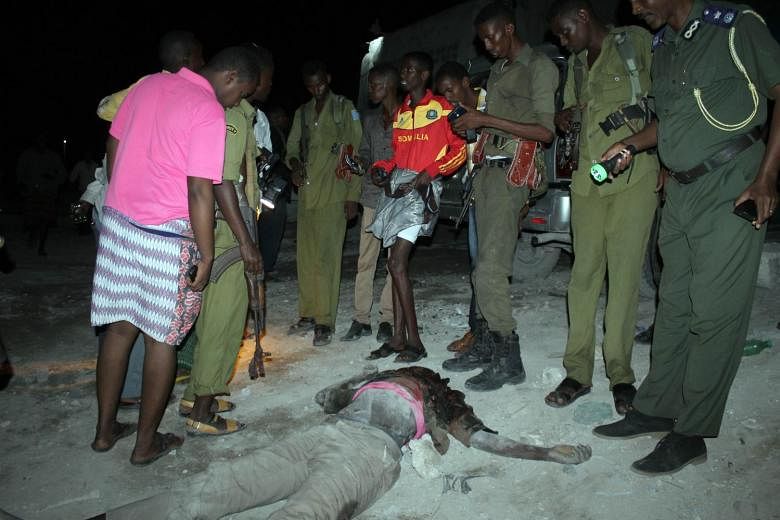MOGADISHU (AFP) - Somalia's Shebab militants stormed two hotels in the capital Mogadishu on Friday, killing at least three people, before they were themselves killed in heavy fighting, security forces said.
At least one suicide bomber used a car packed with explosives to smash open the gates of one of the two hotels, both fortified, guarded, and popular with lawmakers from the nearby parliament, as well as government workers and businessmen.
The twin attacks on the Weheliye and Siyaad were simultaneous and apparently coordinated.
Somalia's National Intelligence and Security Agency later declared the attacks over, adding that at least four militants had been killed.
"Attempts to raid Weheliye Hotel thwarted, situation under control... second attack in Siyaad Hotel has been brought to an end by our forces," the message read.
The security agency said the gunmen were Shebab fighters, calling them "Ugus", the government term for the militants, an acronym in Somali for the phrase, "the group that massacres the Somali people."
Shebab insurgents have carried out repeated attacks in the area, and messages posted on websites close to the Al-Qaeda-linked group said the Islamists claimed responsiblity for the hotel raids.
The Islamic militants have stepped up their attacks during Islam's holy fasting month of Ramadan, and the Friday raids came as people settled down to break their daylight fast.
"Typical Ugus madness to attack at time of breaking fast," the security agency said in a statement.
An AFP reporter saw at least two bodies outside the Weheliye hotel, where a car bomb had rammed the front gate.
"There was a loud blast and explosions," said police officer Abdi Dhuhul, adding that the gunmen "stormed the building."
"The terrorists were killed... we have confirmed three civilians dead at Weheliye hotel," said government security official Mohamed Guhad.
STEPPED UP ATTACKS
The Shebab is fighting to overthrow Somalia's Western-backed government which is propped up and protected by the 22,000-strong African Union force.
Shebab attacks seek to counter claims that they are close to defeat after losing territory in the face of an AU and Somali government offensive and regular US drone strikes against their leaders as well as due to defections.
The militants have also carried out a string of revenge strikes in neighbouring countries - including the September 2013 attack on the Westgate shopping mall in the Kenyan capital Nairobi, which left at least 67 people dead, and the April massacre of close to 150 students in Garissa in Kenya's north-east.
On Tuesday, Shebab gunmen killed 14 workers in Kenya's northern town of Mandera, close to the Somali border.
The upsurge in cross-border attacks and the emergence of Kenya-based Shebab cells is now Kenya's number-one security headache, as well as being a strategic blow given that Nairobi sent troops into southern Somalia in 2011 in the hope they would protect the long, porous border.
In recent weeks, Shebab fighters have attacked AU bases in Somalia, including a base in Lego village, 100km north-west of the capital Mogadishu, manned by around 100 Burundian soldiers.
The Shebab later boasted of having killed 80 soldiers and carried off the bodies of 60 of them, before setting the base on fire.
Video images taken by the Shebab and seen by AFP show several bodies scattered around the ransacked base, with one shot showing around a dozen bodies lined up.
Somalia has been wracked by instability since the collapse of Siad Barre's hardline regime in 1991.

